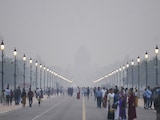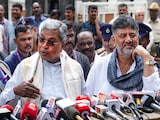Former Indian Air Force Chief BS Dhanoa said there was no Pakistan aircraft within 150 km of India's strike package that bombed a terror camp in Pakistan's Balakot on February 26 last year. He said Pakistan had no knowledge about the Indian air strike.
On this day, a year ago, India carried out multiple strikes at a Jaish terror training camp in Pakistan's Balakot. The attack came after a Jaish-e-Mohammad suicide bomber rammed a car filled with explosives into a CPRF convoy travelling from Jammu to Srinagar, near Pulwama, on February 14, 2019.
"The technical information that was put out in front of the government confirmed that our strike had been successful," Mr Dhanoa said.
"As far as Pakistan is concerned, they need to answer some basic questions. Why will the Indian Aircraft run away? We were firing standoff weapons. Why will we go and hit a forest? They had no knowledge about the targets. They had no knowledge about the kind of weapons that we used, the kind of warheads we used, the fuse setting of that warheads. How much it will penetrate before exploding. They had no knowledge," said the former Air Chief.
"When their first pictures came out, it became clear to me that they have no idea how they have been hit. There was no aircraft within 150 km of our strike package," he added.
The former IAF Chief said the Pakistan Air Force (PAF) was not in the loop with intelligence agency of Pakistan ISI and their national leadership.
"Bhawalpur is known as headquarters of JeM so they thought that IAF will go and hit there to send a message to JeM. As far as air defence alert of PAF goes, they were on a very high alert. After Pulwama happened they had no doubt that the Indian Government will respond. We had even responded after Uri," he said.
Mr Dhanoa said that three buildings at the Balakot terror camp were hit and the people inside "must have died."
"We knew how many people were approximately in every building and the buildings that were targeted were the ones which were of importance. The highest priority was given to the building where people were undergoing their final stage of training before they are pushed inside Jammu and Kashmir," he said.
"Three buildings were targeted and all three were hit. People inside must have died. They would not have survived that kind of weapon," he added.
However, he refused to give the figure of casualties saying that it has already been reported by intelligence agencies.
The former Air Chief said that the political leadership was willing to take the risk.
"Any mission has got a risk to pilots. It is a very big political risk also. What would have happened if we lost an aircraft across the border in trying to strike the JeM camp? There is no mission without risk. Political leadership was willing to take the risk," said Mr Dhanoa.
On February 27 last year, Mr Dhanoa said, the PAF under air defence umbrella of F-16 had carried out attacks with stand-off weapons on India's forward military installations. "I have always maintained that these were a misses because they are the first-generation weapons and second, they were all heavy weapons which were dropped fairly close. Were we expecting a response? Of course, we were. That is why our air defence was in a high state of alert."
He said the IAF had 10 aircraft in the air to counter Pakistan.
"Their Air Defence did not come within 150 km of us. And in our case, we had 10 aircraft in the air to counter them," he added.
"One of them (bombs dropped by PAF) hit a tree. Why will they admit that they missed the target? They were using first-generation weapons. Some bombs missed by 500 metres, some by 1.5 km," he said.
"They tried to send a message that if we can hit them, they can also. However, they failed because of two reasons - first, because of their errors that I don't know (about) and secondly, our air defence had responded. We did a lot of tricks," he said.















